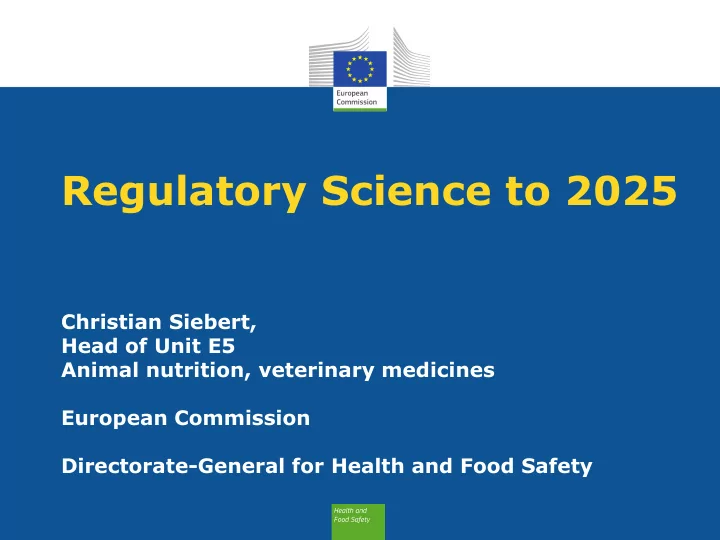

Regulatory Science to 2025 Christian Siebert, Head of Unit E5 Animal nutrition, veterinary medicines European Commission Directorate-General for Health and Food Safety
LOOKING BACK - GOALS Work started back in 2010 with an impact assessment and a vison of three main objectives: • Improve the functioning of the internal market • Safeguard public and animal health and the environment • Create a fit for purpose legal framework for authorising and managing of VMPs
LOOKING BACK - OBJECTIVES To reach these goals following main objectives were identified: • Increase availability of veterinary medicinal products • Address public health risk AMR • Provide legal structures to safeguard the environment
WHERE WE ARE • NVMP Regulation adopted by the EP on 25/10/2018, by the Council on 26/11/2018 • publication in the OJ by end of 2018/beginning of 2019 (determines application date) • entry into force 20 days after publication • will start applying 3 years after entry into force, i.e. early 2022 • implementation work to start immediately after adoption
WHERE WE ARE With the now adopted regulation we succeeded in creating a modern, flexible legal framework with lots of implementing and delegated acts to further define and substantiate on a scientific basis the full particulars and to build up on it when developing innovative technologies concerning - data processing - manufacturing + distribution - animal husbandry - risk communication
TO INCREASE AVAILABILITY OF VETERINARY MEDICINAL PRODUCTS Broaden the scope of the central procedure Reward innovation Reduce administrative burden Provide transparency and predictability Stimulate competitiveness
REDUCE ADMINISTRATIVE BURDEN • Promoting harmonisation of technical standards • Abandon Sunset Clause and Periodic safety update reports • Define rules for clinical trials on legal basis • Define rules on harmonisation of SPCs, "transfer " to MRP after harmonisation • Allow reduced documentation for limited market and exceptional circumstances marketing authorisations
PROVIDE TRANSPARENCY AND PREDICTABILITY • Summarize rules into one act on VMP • Define requirements for biologicals and novel therapies • Fix timeframes for communication • Simplify labelling requirements; multi-language labelling possible • Common logo for online sales
LOOKING INTO THE FUTURE Implementation of the New Regulation will be prepared and happen in the next five years with about 26 delegated and implementing acts, some of them with very tight timeframes of 24 months till publication.
LOOKING INTO THE FUTURE Extensive consultation with MS and stakeholders will be possible at different moments in the procedure: • on the mandates to EMA • after scientific advice is given • on the first legal draft • public consultation • targeted stakeholder consultation in between
TO REWARD INNOVATION • longer data protection periods for initial marketing authorisations, • providing additional protection for technical documentation of existing marketing authorisations for variations with added benefits • for the definite requirements for authorisation of novel therapies and innovative biological products, discuss in depth when drafting the delegated act on Annex II in the next two years.
TO ADDRESS PUBLIC HEALTH RISK AMR • substantiate the methods to gather information about the sales and use of antimicrobial substances • define the criteria for antimicrobial substances restricted to human medicine, • laying down rules for imports from third countries no use of antimicrobials reserved for human medicine in EU no use of antimicrobials for growth promotion
TO ADDRESS PUBLIC HEALTH RISK AMR In three delegated acts • a list of substances restricted to human medicine basing on the criteria defined in the delegated act • rules on the cascade use of antimicrobial substances in aquatic species and • a delegated act on limiting cross-contamination of 24 antimicrobials in medicated feed
STATE OF PLAY IMPLEMENTATION • The Commission together with EMA has taken up preparatory work on the implementation • Emphasis now on mobilising scientific advice and input from EMA, member states’ competent authorities and experts • Work on legal acts organised by priority according to legal deadlines for the final result, work on several acts in parallel
Recommend
More recommend